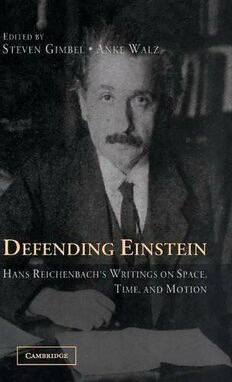
Defending Einstein: Hans Reichenbach’s Writings on Space, Time and Motion PDF
Preview Defending Einstein: Hans Reichenbach’s Writings on Space, Time and Motion
Defending Einstein HansReichenbach,aphilosopherofsciencewhowasoneoffivestudents in Einstein’s first seminar on the general theory of relativity, became Einstein’sbulldog,defendingthetheoryagainstcriticismfromphiloso- phers,physicists,andpopularcommentators.Thisbookchroniclesthe developmentofReichenbach’sreconstructionofEinstein’stheoryina waythatclearlysetsoutallofitsphilosophicalcommitmentsandphysi- calpredictionsaswellasthebattlesthatReichenbachfoughtonitsbehalf, inboththeacademicandpopularpress.Theessaysincludereviewsand responsestophilosophicalcolleagues,suchasMoritzSchlickandHugo Dingler;polemicaldiscussionswiththephysicistsMaxBornandD.C. Miller;andpopulararticlesmeanttoclarifyaspectsofEinstein’stheo- riesandsetouttheirphilosophicalramificationsforthelayperson.This bookisawindowintothedevelopmentofscientificphilosophyandthe roleofthephilosopheratatimewhenphysicsandphilosophywereboth undergoingrevolutionarychangesincontentandmethod. StevenGimbelisassociateprofessorofphilosophyatGettysburgCollege inPennsylvania,wherehewasnamedLutherW.andBerniceL.Thomp- sonDistinguishedTeacherin2005.HehascontributedtoPhilosophyof Science, British Journal of Philosophy of Science, and Studies in History andPhilosophyofModernPhysics. Anke Walz is assistant professor of mathematics at Kutztown Univer- sity.Herworkonthebellowsconjecturerelatingtoflexiblepolyhedrals withR.ConnelyandI.SabitovhasappearedinBeitra¨gezurAlgebraund GeometrieandhasreceivedcoverageinScienceandScientificAmerican. Defending Einstein Hans Reichenbach’s Writings on Space, Time, and Motion Edited by Steven Gimbel Anke Walz Gettysburg College Kutztown University cambridgeuniversitypress Cambridge,NewYork,Melbourne,Madrid,CapeTown,Singapore,Sa˜oPaulo CambridgeUniversityPress 32AvenueoftheAmericas,NewYork,NY10013-2473,USA www.cambridge.org Informationonthistitle:www.cambridge.org/9780521859585 (cid:1)c StevenGimbelandAnkeWalz2006 Thispublicationisincopyright.Subjecttostatutoryexception andtotheprovisionsofrelevantcollectivelicensingagreements, noreproductionofanypartmaytakeplacewithout thewrittenpermissionofCambridgeUniversityPress. Firstpublished2006 PrintedintheUnitedStatesofAmerica AcatalogrecordforthispublicationisavailablefromtheBritishLibrary. LibraryofCongressCataloginginPublicationData Reichenbach,Hans,1891–1953. DefendingEinstein:HansReichenbach’swritingsonspace,time,andmotion/ editedbyStevenGimbel,AnkeWalz. p. cm. ISBN-13:978-0-521-85958-5(hardback) ISBN-10:0-521-85958-1(hardback) 1.Relativity(Physics) 2.Relativity(Physics)–Philosophy. 3.Physics– Philosophy. I.Gimbel,Steven,1968– II.Walz,Anke. III.Title. QC173.55.R439 2006 530.11–dc22 2005036291 ISBN-13 978-0-521-85958-5hardback ISBN-10 0-521-85958-1hardback CambridgeUniversityPresshasnoresponsibilityfor thepersistenceoraccuracyofURLsforexternalor third-partyInternetWebsitesreferredtointhispublication anddoesnotguaranteethatanycontentonsuch Websitesis,orwillremain,accurateorappropriate. Contents Introduction page 1 1 ReviewofMoritzSchlick’sGeneralTheoryof Knowledge 15 2 Einstein’sTheoryofSpace 21 3 ReplytoH.Dingler’sCritiqueoftheTheoryof Relativity 31 4 AReportonanAxiomatizationofEinstein’sTheory ofSpace-Time 45 5 ReplytoTh.Wulf’sObjectionstotheGeneralTheory ofRelativity 57 6 Einstein’sTheoryofMotion 63 7 TheTheoryofRelativityandAbsoluteTransport Time 77 8 ReplytoAnderson’sObjectionstotheGeneral TheoryofRelativity 87 v Contents 9 ReviewofAloysMu¨ller’sThePhilosophicalProblems withEinstein’sTheoryofRelativity 91 10 ThePhilosophicalSignificanceoftheTheoryof Relativity 95 11 PlanetClocksandEinsteinianSimultaneity 161 12 OnthePhysicalConsequencesoftheAxiomatization ofRelativity 171 13 HastheTheoryofRelativityBeenRefuted? 195 14 ResponsetoaPublicationofMr.Hj.Mellin 205 Index 215 vi Introduction Fifty years after the untimely death of Hans Reichenbach, the evolution of his views on space, time, and motion is receiving much due critical attention. While his mature views, expressed most famously in his book Philosophy of Space and Time, have longbeencommentedupon,challenged,andamendedbysome ofthemostimportantfiguresincontemporarydiscussionsofthe philosophical foundations of physics, only in the last decade or so–acoupleofgenerationsremovedfromtheheydayoflogical empiricism–istheworkofReichenbachandcontemporarieslike Moritz Schlick and Rudolf Carnap being widely considered in termsofitsvaluetothehistoryofideas. Thiscollectionseekstocontributetothatgrowingconversa- tionbybringingtogetherEnglishtranslationsofnineessaysfrom 1920–25,theperiodprecedingPhilosophyofSpaceandTime,that have not appeared in earlier collections of Reichenbach’s writ- ings. These articles range from technical discussions published in scientific journals, to overtly philosophical discussions and responsestophilosophicalopponentspublishedinphilosophical 1 DefendingEinstein journals,tosemipopularpiecesdesignedtosetoutReichenbach’s interpretation of relativity theory in clear, explicit terms. It is hoped that by providing access to additional “data points,” the discussionoftheemergenceofReichenbach’slaterviewsmaybe advanced. The first half of the 1920s was a period of crucial impor- tancebothtotheburgeoningmovementthatwouldbecomeana- lytic philosophy and to the philosophical development of Hans Reichenbach personally. This was the period that saw Schlick move to Vienna, the publication of Ludwig Wittgenstein’s Trac- tatusLogico-Philosophicus,andAlfredTarski’sinitialworkonset theory.ItwasalsothetimeinReichenbach’slifewhenhesoughtto puthisnameonthephilosophicalmap.Leavinganengineering position in Berlin, he accepted his first academic post, Privat- dozentattheTechnischeHochschuleinStuttgart.Asanassistant to the physicist Erich Regener, he undertook a diverse teaching load covering courses in modern physics, radio technique, and philosophy;hisresearchlargelyfocusedupondevelopingarigor- ous epistemic foundation for the theory of relativity – a project thathehadstartedinBerlinafterattendingEinstein’slecturesat theuniversitythereandthathadledtothepublicationofhisfirst book,TheoryofRelativityandAPrioriKnowledge,earlierin1920. This rigorous epistemic foundation would be laid out in termsofwhatReichenbachcalleda“constructiveaxiomatization,” appearing in full for the special theory of relativity in Reichen- bach’s1924publicationAxiomatizationoftheTheoryofRelativity. Thisaxiomatizationwassetoutwithtwoequallyambitiousgoals inmind.First,itwastogiveacompleteandunambiguousaccount ofalloftheempiricalanddefinitionalcommitmentsofEinstein’s theories. This would allow for an objective assessment of the strengthofexperimentalevidenceinfavorofthetheory,aswellas 2 Introduction adeterminationofexactlywhatportionsofthetheoryremained empiricallyunconfirmed,andcouldbeusedtoclarifyandcom- mentreasonablyuponobjectionsraisedtothetheory.Thisfinal concern was no small matter as Reichenbach notes that during this period, in discussions of the theory of relativity “dogmatic understandingisfoundnexttoclearinsight.”1 Armedwithhisanalysisofrelativitytheoryandhisabilityto translatecomplextechnicalnotionsintoplainlanguage,especially throughtheuseofcolorfulanalogies,Reichenbachsetouttobe Einstein’sbulldog.ReichenbachwouldconfrontEinstein’scritics ontheirownturf,whetherinthescholarlyarenaorthepopular press,whethertheobjectionwasbaseduponscientific,epistemo- logical,logical,orintuitivegrounds.Hetookitashismissionto defend and popularize the relativity theory, writing articles and responsesinprofessionalphysicsandphilosophyjournals,books forthegeneralreader,andarticlesinpopularsciencemagazines, evengivingaseriesofradiobroadcasts. ReichenbachsawthediscussionofEinstein’sworkonrelativity advancing on two distinct fronts. On one side were those com- mentatorswhotookissuewiththetheoryofrelativityonphysical orapriorigroundsbutwhohadlittleornounderstandingofthe detailsofthetheory,andontheothersidestoodthoseopposedto Einsteindespitebeingwellschooledinphysicaltheory.Thefirst group contained its share of cranks. For example, in “Einstein’s Theory of Motion” (Chapter 6 in this collection), Reichenbach recountstalesofsuchintellectual“off-keynotes,”includingone opponent who wrote to the Swedish Academy demanding the Nobel Prize for uncovering “the ‘miscalculation’ in Einstein’s theory.”Reichenbachneverheldbackonhissharpwitindealing 1 Reichenbach1920a,p.2. 3 DefendingEinstein with such attacks, but far from engaging in mere ad hominem argument,hesoughttoclearlyrefuteallobjections. But the group also contained a fair number of respected philosophers.Indeed,Reichenbachreferstothisperiodas“atime of increasing philosophical unrefinement (including among the tenured philosophers).”2 Criticism of relativity came from vir- tually all corners of the philosophical landscape, most notably fromNeo-KantiansandMachianPositivists.AcoregroupofNeo- Kantians, such as Ewald Sellien and Ilsa Schneider, realized the threat that relativity, with its lack of absolute time and its use of non-Euclidean geometry, posed to an orthodox understand- ingofthetranscendentalaestheticandsoughttoprovideapriori grounds for the theory’s failure. To this audience, Reichenbach couldpointtohisTheoryofRelativityandAPrioriKnowledge,in which he sought to salvage what he thought important in Kant andjettisonthatwhichhesawasproblematic. Not all Neo-Kantians, of course, took such a dogmatic and flawed postion. Ernst Cassirer, in particular, is singled out by Reichenbach as having “awakened Neo-Kantianism from its ‘dogmatic slumber’, while its other adherents carefully tried to shielditfromanydisturbancebythetheoryofrelativity.”3 Hav- ing attended Cassirer’s lectures in 1913–14, and having been exposedtoKantearlierbyAloisRiehl,ErnstvonAster,andKarl Stumpf,Reichenbach’sworkmaintainedastrongKantianelement throughouttheentirespanofhiswritings,butitisespeciallyevi- dentinthisearlyperiod. BesidetheNeo-Kantiandiscussions,Machianpositivistswere also quite vocal on issues pertaining to the theory of relativity. 2 Reichenbach1920b,p.1. 3 Reichenbach1921a,p.25. 4
